"Ulbricht-Doktrin" oder "Gomułka-Doktrin"? Das Bemühen der Volksrepublik Polen um eine geschlossene Politik des kommunistischen Blocks gegenüber der westdeutschen Ostpolitik 1966/67
“Ulbricht Doctrine“ or “Gomułka Doctrine“? The People ’s Republic of Poland and its efforts for a unified policy of the Communist bloc towards the West German Ostpolitik 1966/1967
Author(s): Wanda JarząbekSubject(s): Diplomatic history, Political history, Post-War period (1950 - 1989), History of Communism, Peace and Conflict Studies
Published by: Verlag Herder-Institut
Keywords: “Ulbricht Doctrine“; “Gomułka Doctrine“; People ’s Republic of Poland; unified policy; Communist bloc; West German Ostpolitik 1966/1967;
Summary/Abstract: When it became apparent with the so-called peace note of March 1966, Władysław Gomułka and the Polish leadership regarded the new orientation of the West German Ostpolitik as a threat to their policy towards Germany pursued up to then. Among the main aims of this German policy, which had been drafted after his obtaining the post of First Secretary of the Central Committee of the Polish United Workers’ Party (P.Z.P.R.) in October 1956, and which the author defines as “Gomułka Doctrine”, were the international recognition of the final character of the Oder-Neisse line (also by the Federal Republic) and the weakening of Bonn’s position in international politics, not least motivated by the desire to prolong, if not prevent at all, a reunification of Germany. Like the GDR, Poland strove to take advantage of the Federal Republic’s interest in relations with the countries of the Eastern bloc in order to realize its own goals. Both states considered Moscow’s policy, which was highly interested in settling relations with the Federal Republic and in establishing broader economic contacts, and therefore did not want to confront Bonn with unpleasant demands, to be unsatisfactory. The other bloc countries, too, were in a better starting position for talks with the West German government, since their bilateral relations with the Federal Republic were far less burdened by history. In this situation, Gomułka endeavoured to work out a joint policy for the bloc countries, which was to be based on a catalogue of conditions to be fulfilled by the Federal Republic when taking up diplomatic relations with any of the bloc countries. One of Poland’s possible allies was the GDR, even though the leaders of the two states did not have a liking for each other and the bilateral cooperation did not work very well. In early April, both states set their conditions and tried to have them included into the joint programmes of the bloc countries. Likewise, they attempted to move Moscow to support their plan to coordinate the German policy of the Eastern bloc. A lot has been written about the role Walter Ulbricht played in this context around 1966/67, while Gomulka’s significance has remained underestimated. The present paper intends to illuminate the activities of Polish politics at that time. Among other things, it describes the activities of the P.Z.P.R. leadership and Polish diplomacy concerning the other Eastern bloc countries, which were to be urged into solidarity with Poland at the cost of realizing their own interests. While historians have usually restricted themselves to relations within the triangle Federal Republic - Poland - GDR, this broader perspective allows the author to integrate the conflicting interests of the individual states within the Warsaw Pact, which, from the outside, has often been perceived as a monolithic bloc.
Journal: Zeitschrift für Ostmitteleuropa-Forschung
- Issue Year: 55/2006
- Issue No: 1
- Page Range: 79-115
- Page Count: 37
- Language: German

